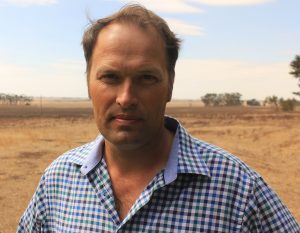
VFF president David Jochinke in the Gazette fire area last month.
THE Victorian Farmers Federation is seeking Category C funding for Natural Disaster Relief and Recovery Arrangements to assist farmers recovering from the St Patrick’s Day fires in south-west Victoria.
VFF president David Jochinke said some farmers are faced with renovating 50-100 percent of their pastures destroyed by the fires, involving significant seed, contracting and fertiliser costs.
NDRRA Category C assistance is for severely affected communities, regions or sectors and includes clean-up and recovery grants for small businesses and primary producers and/or the establishment of a Community Recovery Fund. Category C assistance is only made available when the impact of a disaster is severe. It is requested from states and requires agreement from the Prime Minister.
Meanwhile Mr Jochinke urged fire-affected farmers to access a free one-on-one pasture recovery advice service being offered by Agriculture Victoria.
Agriculture Victoria is offering the pasture advice service to help landholders affected by the March fires get their pastures back on track before the autumn break.
“If farmers make goood decisions on pasture seed and preparation now, then hopefully the recovery period will be shortened,” Mr Jochinke said.
He said there was still a need for good quality hay in the fire-affected areas, but groups such as Lions and Blaze-Aid were doing an excellent job assisting farmers.
Fires can change pasture composition and carrying capacity
Extension officers from Agriculture Victoria and WestVic Dairy have joined forces to deliver the new service to ensure people can access information tailored specifically to their farm.
Agriculture Victoria extension officer Michele Jolliffe from Agriculture Victoria said many farmers affected by the recent fires were wanting to better understand the full impact fires had on their pasture and how they might respond to decent rainfall when it happens.
“Fires can have a drastic effect on a pasture; changing the composition, reducing growth and their carrying capacity in the following season.
“No two farms are the same and because the intensity of the fires varied so much, even in the same paddock, we thought it would be most helpful to work with people one-on-one so that those affected can develop a plan to get their pastures back to being productive sooner,” Ms Jolliffe said.
Ms Jolliffe said the 5-20mm of rain across most of the fire-affected areas in recent weeks has provided enough moisture for germination and help farmers make informed decisions about pasture renovation, fertiliser and weed control. In most areas the fires had constituted a cool to moderate burn and some pastures had started germinating with the rain, however; some farms had sustained hot burns inflicting more damage to pastures.
However, farmers had only 4-5 weeks before soil temperatures started to fall to plan pasture renovation, depending on rainfall and frosts. She recommended farmers take the time to walk their paddocks and see what has germinated before undertaking pasture renovation.
Mr Jochinke said farmers might have only a month or just over to establish permanent pastures before soil temperatures dropped or paddocks in some areas became inaccessible for heavy equipment.
“The big issue is that if they are not planning to do it (pasture renovation) now, even though it is dry, the window for getting pasture in the ground is pretty tight before it is potentially going to be wet.
“The Cobden area can get very wet and farmers needed to maximise pasture growth before soil temperatures drop,” he said.
“Those are the two main drivers – temperature and trafficability – and getting people to make those pasture decisions.”
Filling the winter feed gap is a high priority
WestVic Dairy regional manager Lindsay Ferguson from said getting pastures established now to fill the winter feed gap, would be high on farmers’ recovery priority list.
“Fire-affected farms will need to make decisions in a shorter timeframe than normal, given the amount of work that they are doing to get up and running again,” Mr Ferguson said.
This special service will help with feed budgeting and provide some tailored recommendations about species, sowing rate and fertiliser which will help with those decisions.”
To speak to an extension officer about your situation and to organise a free visit please contact:
For graziers – Michele Jolliffe from Agriculture Victoria on 0428 581 883
For dairy farmers – Helen Chenoweth from WestVic Dairy on (03) 5557 1000.
Farmers who need fodder for their livestock can contact the Victorian Farmers Federation on 1300 882 833.
The Rural Financial Counselling Service is also available to offer free and independent financial support to primary producers and non-agriculture related small businesses. The service can be contacted on 1300 735 578.
Detailed information about recovering from fire, including a pasture recovery quick reference guide, can be found at www.agriculture.vic.gov.au/firerecovery

HAVE YOUR SAY